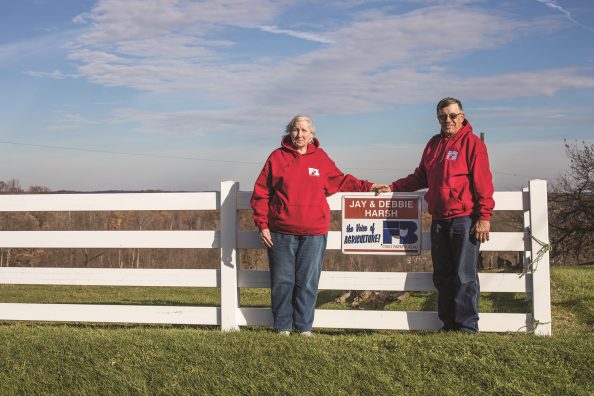Applications for Ohio Farm Bureau Health Plans now available
Members have three ways to apply: contacting a certified agent, calling 833-468-4280 or visiting ohiofarmbureauhealthplans.org.
Read MoreIt’s hard for the husband and wife team Jay and Debbie Harsh, who serve as co-chairs of the Stark County Farm Bureau membership committee, to sum up their motivation to attract new members to the organization.
Is it the lobbying power of one voice to affect change, such as the Current Agricultural Use Value reform accomplished last year? Is it the power to come together in local communities and make a positive impact on friends and neighbors, spreading facts about agriculture along the way? Is it the ability to call on the time and talent of Farm Bureau staff, fellow members and others who work in agriculture? Is it the savings from businesses such as Ford and John Deere, products and services from Nationwide plus scores of other members only benefits?
The short answer for the Harshes, who operate a 120-acre crop and livestock farm in Minerva, is a resounding “yes!”
“I lived on a farm all my life,” Jay Harsh said. “But until I really got involved in Farm Bureau, I had no idea Farm Bureau does what they do.”
Debbie Harsh agreed.
“People are quite amazed when I explain it all to them,” she said, noting that she recently signed up two assistant managers in the produce section of the Walmart where she works. Many people she has signed up over the years had no idea Farm Bureau would be able to help in the ways it does, such as giving guidance on settling a dispute with a neighbor, negotiating with an energy company or helping new farmers navigate the landscape.
“If Farm Bureau quits fighting for these rights for you, where will you be then?” Debbie asked. “We’ll all be up a creek.”
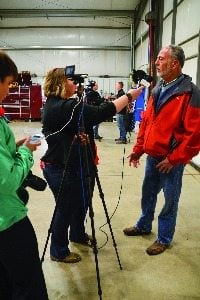
Fighting for farmers paid off for member Bill Kellogg of Forest, who is also part of Ohio Farm Bureau’s Blanchard River Demonstration Farms network, a partnership conducting edge-of-field research in an effort to protect water quality in the Western Lake Erie Basin.
Statewide, Ohio farmers saw a 307 percent increase in property taxes between 2008 and 2014. Those higher taxes were being paid at a time when some farm crop prices had fallen as much as 50 percent.
That had a significant impact on the Kelloggs as was evidenced when Bill received his new CAUV valuation statement last fall. Kellogg and his son, Shane, run a 4,200-acre grain operation in Hardin County.
“From the old CAUV statement to the new, it was an over $200,000 (value) drop,” he said. “I don’t know exactly what the savings will be, but our taxes had gone up so much and crop prices had gone down, it was just an expense we didn’t need.”
Ohio Farm Bureau took aggressive action starting in 2014 to address the CAUV calculations that were drastically increasing some property tax bills for farmland owners. The collective power of Farm Bureau was impressive, he said.
“Their legislative power standing up for the farming community, having a voice in the government, that’s very important,” Kellogg said. “We’re seeing the results.”
Those kinds of results come from Farm Bureau’s grassroots structure via a long-established policy development process.
Issues as complex as CAUV to as simple as moving farm equipment on county roads with a vehicle weight limit come to light beginning at Farm Bureau’s county level. Depending on the issue, policies being proposed to address any number of concerns go through a policy development committee process at the county, state and, when warranted, national level through the three-tiered Farm Bureau organization.
It’s a process that veteran Farm Bureau Organization Director Jill Smith, who works with county Farm Bureaus in western Ohio, said would convince anyone with a vested interest in agriculture about the importance of the work the organization accomplishes.
“Every (proposed) policy is reviewed and discussed thoroughly,” said Smith, who recently attended the state Farm Bureau’s policy development committee meeting in preparation for the organization’s annual meeting at the end of last year. “If everyone had an opportunity to sit in on that meeting and see the work the committee does on behalf of members, we would have no problem selling memberships.”

Jeff Schilling, a fourth-generation farmer with a 600-acre corn, soybean and wheat operation in Galloway, has been active in Farm Bureau for almost 20 years. He is in his third term as president of Franklin County Farm Bureau.
He said having a unified voice for those whose livelihoods depend on the agricultural industry, knowing that “tens of thousands of people feel the same way” is key, but it doesn’t end there when asking people to become part of Farm Bureau.
“We try to highlight the member benefits that we have,” he said, noting that “thinking outside the box” regarding membership is important in an urban county such as Franklin.
“We have landscapers, greenhouse (operators), breweries who are members,” he said, adding that if “you care about preserving the family farm and farmers’ ability to farm locally,” the organization is for you.
“You don’t have to be a corn and soybean farmer to be a part of Farm Bureau,” Schilling said.
As a matter of fact, you can be a Ford dealer.
Doan Ford in Belmont County became a group member of Farm Bureau after General Manager Steve Mercer was in contact with Organization Director Betsy Anderson and learned about the organization.

He decided being actively engaged in Farm Bureau was going to work out as a “win-win for everybody” as Ohio embarked on a partnership and discount with the automotive giant last year.
“If Ford’s offering it, we want to be a part of it and do our fair share. I wanted all our salespeople to be members,” Mercer said. Shortly thereafter Doan Ford partnered with the county Farm Bureau to help boost the local organization’s Veterans Day event last November.
Farmers, consumers, businesses and entire communities are tied together through Farm Bureau.
“Farm Bureau is here for farmers and we do the best we can,” Jay Harsh said, ultimately summing up the importance of Farm Bureau membership. “Consumers want safe food, good water quality, what farmers want, too. Anyone who eats food should be a Farm Bureau member.”
Farm Bureau is a grassroots organization led by our members, for our members. We have a volunteer membership campaign in each of our 88 counties to grow the organization at the local, state and national level, so we can continue to carry out our mission of working together for Ohio farmers to advance agriculture and strengthen our communities. You’re invited to participate in the membership campaign.
Membership makes it happen and we need your help. You don’t need to have a sales background; you simply need to have a conversation with a friend, neighbor or coworker about why you believe in the organization. Naturally, this will lead to the strong benefits that Farm Bureau can provide and allow you to ask them to join you as a fellow member.
For nearly 100 years we have been working Together with Farmers to solve important issues that affect our members and their communities. We invite you to be part of this great tradition and Step up for Membership by renewing or volunteering to sign members yourself.
Visit StepUpforMembership.org to learn more about volunteering for the membership campaign. You can find the date and location for the campaign kickoff in your community.
Feature photo: Debbie and Jay Harsh are long-time Farm Bureau members and membership co-chairs in Stark County. Photo by Bryan Rinnert


Members have three ways to apply: contacting a certified agent, calling 833-468-4280 or visiting ohiofarmbureauhealthplans.org.
Read More

Legacy nutrient deductions enable new farmland owners to claim deductions on the nutrients within the soil on which healthy crops depend.
Read More

Farmers, agribusinesses and community members are encouraged to nominate their local fire departments for Nationwide’s Nominate Your Fire Department Contest through April 30.
Read More

Introduced by Sen. Paula Hicks-Hudson, SB 120 would establish the Urban Farmer Youth Initiative Pilot Program.
Read More

Gases, vapors, and fumes can all create risk. How can we measure and protect ourselves from them?
Read More

The Ohio Farm Bureau’s Young Agricultural Professionals State Committee has named its 2026 leadership and the individuals who will be serving on the state committee for 2026-2028.
Read More

The Ohio Farm Bureau Foundation has multiple scholarships available to Ohio students from rural, suburban and urban communities who are pursuing degrees with a connection to the agricultural industry.
Read More

With 100% bonus depreciation now permanent, farmers can deduct the full cost of a new agricultural building in the year it’s placed in service.
Read More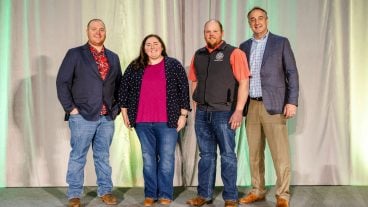
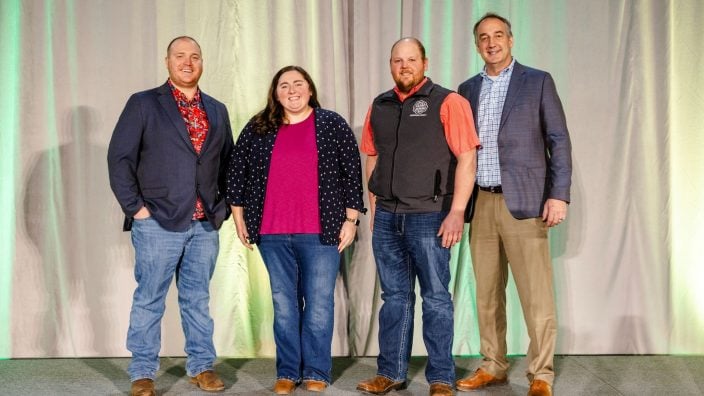
Lincoln Deitrick was named the Outstanding Young Farmer, Denver Davis won the Excellence in Agriculture Award, and Margaret Houts won the Discussion Meet.
Read More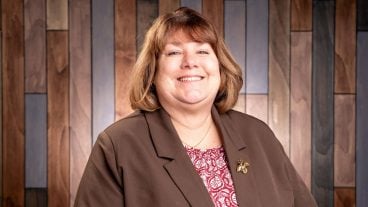
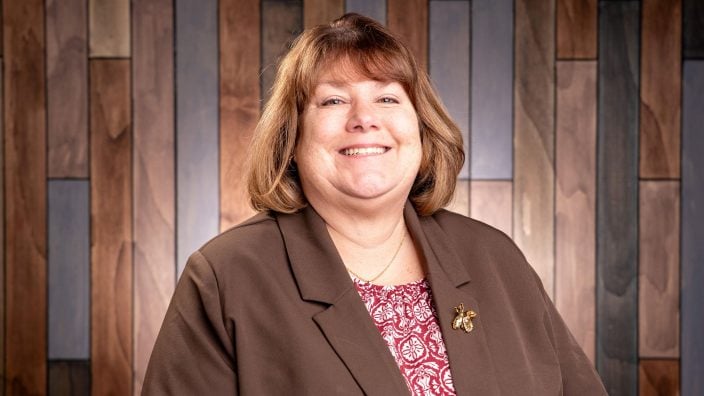
Michelle Downing of Franklin County has been named finance director of county operations for Ohio Farm Bureau.
Read More